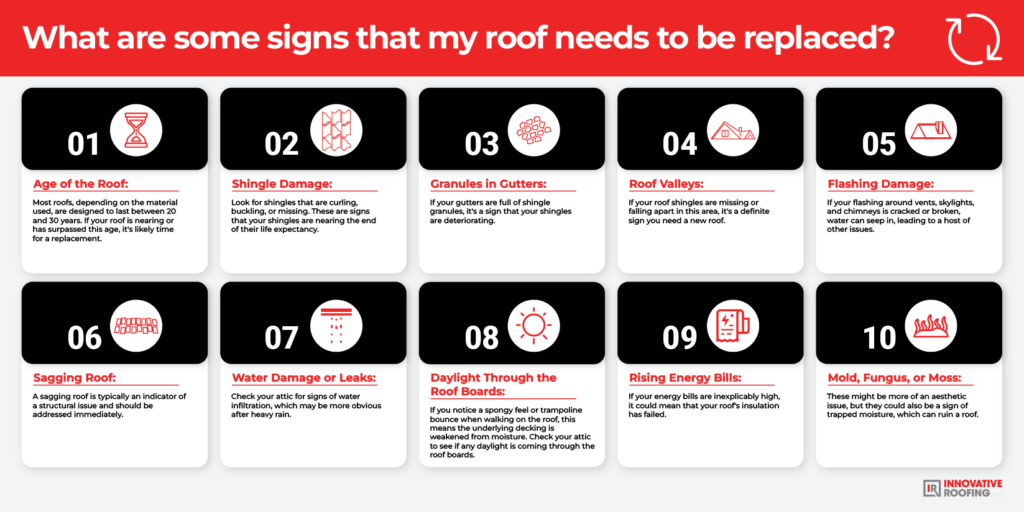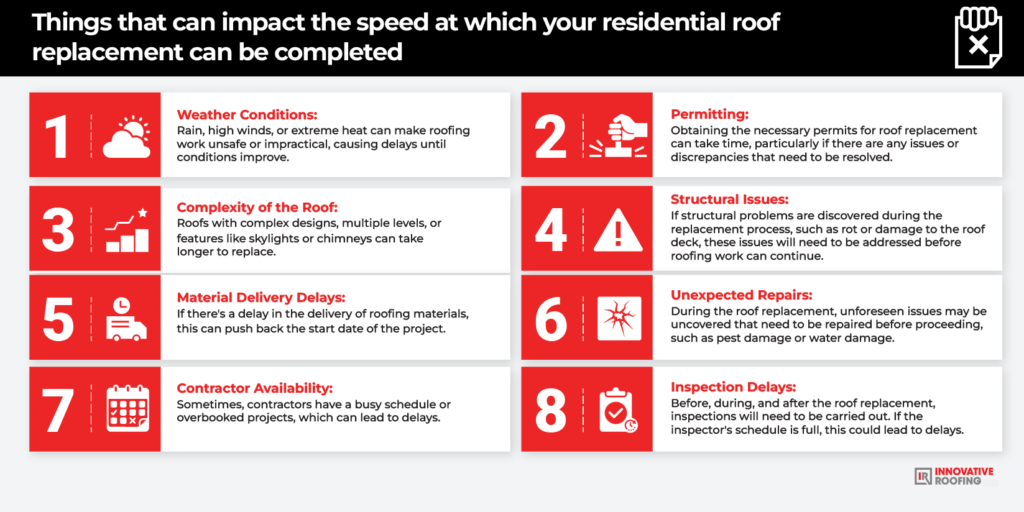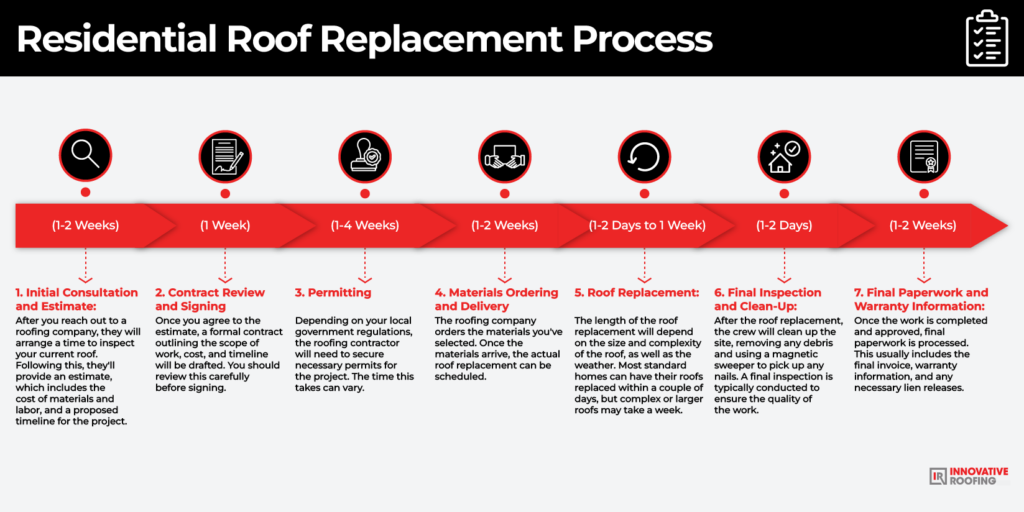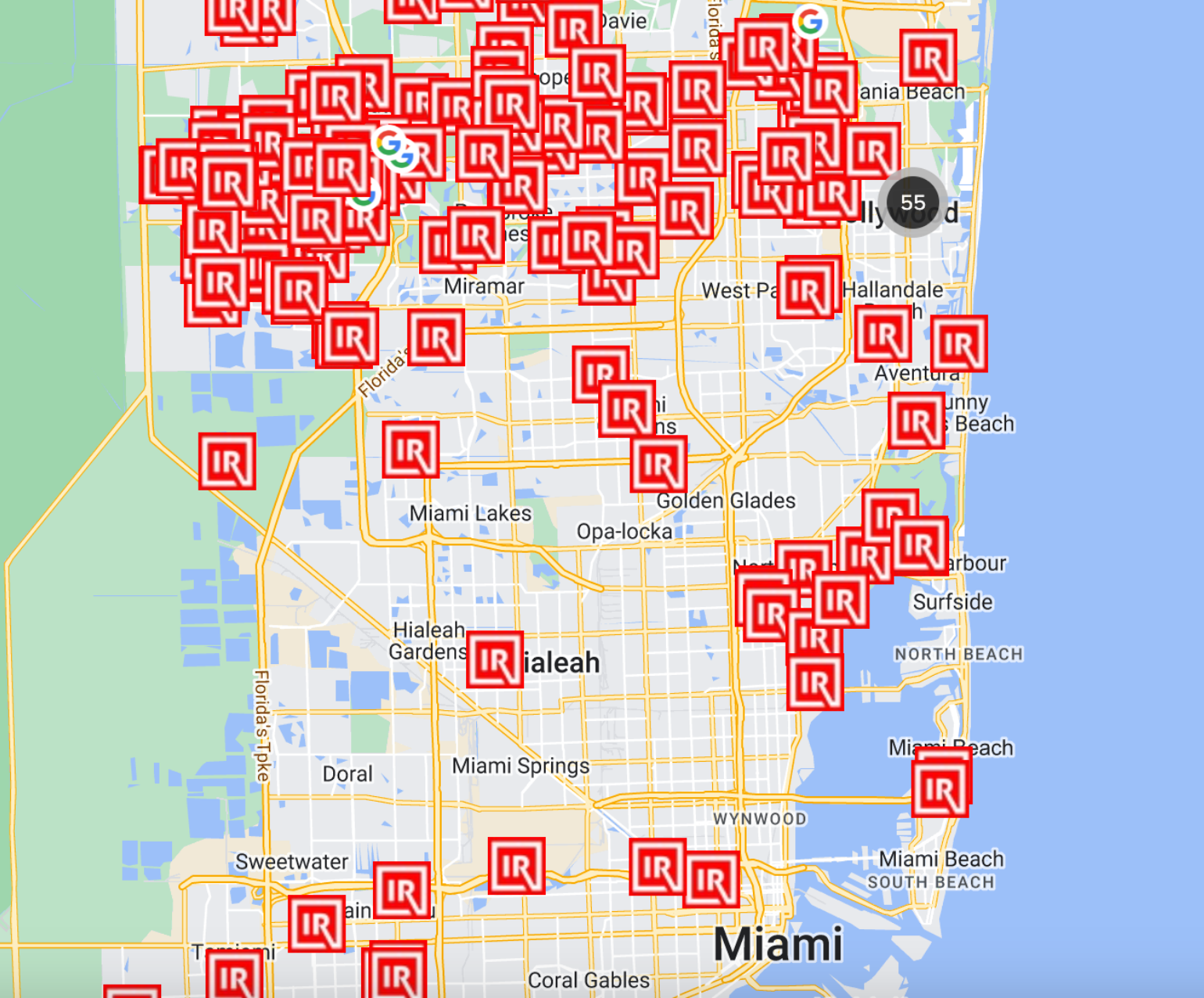Navigating the process of residential roof replacement can be a daunting task. Whether it’s your first time replacing a roof or you’ve done it before, numerous questions likely arise – from understanding costs and selecting appropriate materials, to knowing what to expect during the installation process. We know that a well-informed homeowner can make confident and effective decisions, and that’s why we’ve put together this comprehensive guide: “Residential Roof Replacement: All Your Questions Answered.”
While this article has been primarily focused on Residential Roof Replacement, you can dive into nitty-gritty of Commercial Roof Repairs, by following the link.
In this article, we aim to demystify the process of roof replacement, providing clear and concise answers to the most common questions homeowners tend to have. We’ll cover everything from cost estimation and financing options to selecting a reliable roofing contractor, understanding permits and warranties, and even tips on how to maintain your new roof. Let’s dive in and make the path to your new roof as smooth as possible.
These are some of the main topics we’ll cover on this article:
- How do I know if it’s time to replace my roof?
- What types of roofing materials are best for my home and climate?
- How much will a new roof replacement cost?
- What are some signs that my roof needs to be replaced?
- How long will the roof replacement process take?
- How’s the residential roof replacement process?
- What kind of warranty is offered on the new roof?
- Are there financing options available for roof replacement?
- Do I need a permit for a roof replacement, and if so, will the company handle it?
How do I know if it’s time to replace my roof?
Recognizing when it’s time to replace your roof is crucial to maintaining the safety and integrity of your home. Several telltale signs indicate that your roof may be nearing the end of its lifespan and might need replacement.
The first thing to consider is the age of your roof. Most roofs, depending on the material used, are designed to last between 20 and 30 years. If your roof is nearing or has surpassed this age, it may be time to consider a replacement. Additionally, if your roof frequently needs repairs, or if you’re experiencing leaks in multiple places, these could be signs that your roof is failing.
Another clear indicator is if your shingles are damaged or missing. Shingles that are cracked, curled, or missing can leave your roof vulnerable to the elements, potentially leading to further damage. Similarly, if you notice granules from asphalt shingles in your gutters or around your property, this could mean your shingles are nearing the end of their lifespan. Other signs include sagging areas on your roof, issues with your roof’s flashing, or visible signs of water damage or mold in your attic.
Engaging a professional roofer for an inspection can provide more certainty about whether it’s time to replace your roof. They can assess its overall condition and provide expert recommendations. Remember, while replacing a roof can be a significant investment, it’s crucial to protect your home’s structural integrity and avoid potential damage or costly residential roof repairs down the line. Regular inspections and timely replacement can ensure your roof serves its vital purpose – protecting your home and everything inside it.
What types of roofing materials are best for my Florida home?
Choosing the right roofing material for your home in Florida involves understanding the unique climate conditions of the region and how different types of roofing materials perform under these conditions. Florida’s weather, characterized by high humidity, intense heat, frequent rain, and occasional hurricanes, necessitates a roof that can withstand these elements while offering longevity and aesthetic appeal.
The three most common types of roofing materials that stand up well to Florida’s climate are metal, tile, and asphalt shingles. Metal roofing is highly durable, resistant to wind and fire, and reflects sunlight, making it energy-efficient. Tile roofs, often made from clay or concrete, are robust and excellent at withstanding Florida’s intense sun and heavy rain. However, they are more expensive than other options. Asphalt shingles, while less durable than metal or tile, are an affordable option that still offers decent weather resistance and a variety of styles.
When choosing from these different types of roofing materials, it’s important to consider factors such as your budget, the architectural style of your home, and your personal preferences in addition to the climate considerations. It’s also wise to consult with a professional roofing contractor who has experience with Florida’s unique conditions. They can provide valuable guidance and ensure that the material you choose offers the best protection and value for your specific situation. Remember, the right roofing material can greatly enhance your home’s longevity, curb appeal, and value, making this decision a significant one.
How much will a new roof replacement cost?
Understanding the cost of a new roof replacement is crucial when planning for this significant home improvement project. It’s important to note that the roof replacement cost in Florida can vary considerably depending on a number of factors. These include the size and complexity of the roof, the materials chosen, the labor costs of the roofing contractor, and any additional requirements like permits or specialized services.
On average, homeowners can expect to pay anywhere from $5,000 to $10,000 for a roof replacement in Florida. However, this can rise substantially if you opt for premium materials or if your roof has unique features such as steep slopes, skylights, or chimneys that require additional work. The cost of a metal roof, for instance, may be higher than asphalt shingles due to its durability and longer lifespan.
Remember, while the initial roof replacement cost in Florida might seem high, an investment in a quality roof can offer significant long-term value. A new, well-installed roof will provide better insulation, lower energy costs, enhanced curb appeal, and peace of mind knowing that your home is well-protected against Florida’s often harsh weather conditions. It’s always recommended to obtain quotes from several reputable roofing contractors to ensure you receive the best value and quality workmanship. When considering these roof replacement quotes, remember that the cheapest option isn’t always the best – the key is to balance cost, quality, and durability for the best overall investment.
What are some signs that my roof needs to be replaced?
Recognizing the warning signs that your home needs a residential roof replacement can save you from significant damage and unexpected costs down the line. While some signs may be quite obvious, others might be more subtle and only discernible to the trained eye.

- Age of the Roof: Most roofs, depending on the material used, are designed to last between 20 and 30 years. If your roof is nearing or has surpassed this age, it’s likely time for a replacement.
- Shingle Damage: Look for shingles that are curling, buckling, or missing. These are signs that your shingles are nearing the end of their life expectancy.
- Granules in Gutters: If your gutters are full of shingle granules, it’s a sign that your shingles are deteriorating.
- Roof Valleys: If your roof shingles are missing or falling apart in this area, it’s a definite sign you need a new roof.
- Flashing Damage: If your flashing around vents, skylights, and chimneys is cracked or broken, water can seep in, leading to a host of other issues.
- Sagging Roof: A sagging roof is typically an indicator of a structural issue and should be addressed immediately.
- Water Damage or Leaks: Check your attic for signs of water infiltration, which may be more obvious after heavy rain.
- Daylight Through the Roof Boards: If you notice a spongy feel or trampoline bounce when walking on the roof, this means the underlying decking is weakened from moisture. Check your attic to see if any daylight is coming through the roof boards.
- Rising Energy Bills: If your energy bills are inexplicably high, it could mean that your roof’s insulation has failed.
- Mold, Fungus, or Moss: These might be more of an aesthetic issue, but they could also be a sign of trapped moisture, which can ruin a roof.
If you notice any of these signs, it’s advisable to contact a professional who can provide a detailed assessment and explain the steps involved in the residential roof replacement process. Regular inspections can help you spot these warning signs early and allow for timely intervention, potentially extending the life of your roof and saving you money in the long run.
How long will the roof replacement process take?
If you’re planning a residential roof replacement, it’s essential to know how long does it take to replace a roof to properly plan and prepare. The time it takes to complete a roof replacement can vary significantly depending on a variety of factors.

Typically, a professional roof replacement can be completed within a span of one to two days. However, the duration of the project is influenced by various elements. These include the extent of the job, the approach employed for the roof replacement, weather conditions, and the intricacies of the roof’s design.
The size and complexity of the roof are two of the most significant factors influencing the timeline. A small, straightforward roof could be completed in a couple of days, while larger or more complex roofs with features like multiple levels, steep slopes, or skylights might take a week or more. The type of roofing material being installed also impacts the duration of the project; for instance, asphalt shingles can typically be installed faster than heavier, more complex materials like slate or tile.
Below is a list of things that can impact the speed at which your residential roof replacement can be completed:
- Weather Conditions: Rain, high winds, or extreme heat can make roofing work unsafe or impractical, causing delays until conditions improve.
- Permitting: Obtaining the necessary permits for roof replacement can take time, particularly if there are any issues or discrepancies that need to be resolved.
- Complexity of the Roof: Roofs with complex designs, multiple levels, or features like skylights or chimneys can take longer to replace.
- Structural Issues: If structural problems are discovered during the replacement process, such as rot or damage to the roof deck, these issues will need to be addressed before roofing work can continue.
- Material Delivery Delays: If there’s a delay in the delivery of roofing materials, this can push back the start date of the project.
- Unexpected Repairs: During the roof replacement, unforeseen issues may be uncovered that need to be repaired before proceeding, such as pest damage or water damage.
- Contractor Availability: Sometimes, contractors have a busy schedule or overbooked projects, which can lead to delays.
- Inspection Delays: Before, during, and after the roof replacement, inspections will need to be carried out. If the inspector’s schedule is full, this could lead to delays.
It’s also important to remember that weather can significantly affect how long it takes to replace a roof. Roofing work requires dry conditions, so rain, snow, or high winds can cause delays. Furthermore, keep in mind that these estimates represent the actual construction time. Additional time might be needed for the initial assessment, obtaining permits, ordering materials, and the final cleanup and inspection. When planning for a roof replacement, be sure to discuss the projected timeline with your roofing contractor to ensure that your expectations align with the estimated schedule.
How’s the residential roof replacement process?
Homeowners often worry about the safety of their home’s interior during the roof replacement process. While it’s natural to have these concerns, it’s essential to know that reputable roofing contractors will take all necessary precautions to safeguard your property during the project.

Here’s a typical timeline of the process involved in replacing a residential roof:
1. Initial Consultation and Estimate (1-2 Weeks): After you reach out to a roofing company, they will arrange a time to inspect your current roof. Following this, they’ll provide an estimate, which includes the cost of materials and labor, and a proposed timeline for the project.
2. Contract Review and Signing (1 Week): Once you agree to the estimate, a formal contract outlining the scope of work, cost, and timeline will be drafted. You should review this carefully before signing.
3. Permitting (1-4 Weeks): Depending on your local government regulations, the roofing contractor will need to secure necessary permits for the project. The time this takes can vary.
4. Materials Ordering and Delivery (1-2 Weeks): The roofing company orders the materials you’ve selected. Once the materials arrive, the actual roof replacement can be scheduled.
5. Roof Replacement (1-2 Days to 1 Week): The length of the roof replacement will depend on the size and complexity of the roof, as well as the weather. Most standard homes can have their roofs replaced within a couple of days, but complex or larger roofs may take a week.
6. Final Inspection and Clean-Up (1-2 Days): After the roof replacement, the crew will clean up the site, removing any debris and using a magnetic sweeper to pick up any nails. A final inspection is typically conducted to ensure the quality of the work.
7. Final Paperwork and Warranty Information (1-2 Weeks): Once the work is completed and approved, final paperwork is processed. This usually includes the final invoice, warranty information, and any necessary lien releases.
Will my home’s interior be protected during the replacement process?
Before the actual roof replacement process begins, the crew typically covers the landscaping and surrounding areas of your home with tarps to protect them from falling debris. Inside your home, it’s advisable to remove wall decorations and other fragile items, as the vibrations from the roof work may shake them loose. For further protection, some contractors may also suggest covering items in the attic with plastic sheets to prevent dust or small debris from settling on them.
In addition, the best roofing professionals will offer a thorough clean-up and debris removal service after the replacement work is complete. This includes using magnetic tools to pick up any nails or metal objects that may have fallen around your property. By choosing a trustworthy contractor and understanding what to expect, you can rest assured that your home’s interior will be well-protected during the roof replacement process.
What kind of warranty is offered on the new roof?
When it comes to investing in a new roof for your home, understanding the terms of the new roof warranty is paramount. The warranty essentially serves as a promise from the manufacturer and the roofing contractor that your new roof will perform as expected over a specific period of time. But what exactly does a new roof warranty cover, and how long does it last?
A new roof warranty has two main components: The manufacturer’s warranty and the workmanship warranty. The manufacturer’s warranty covers defects in the roofing materials. (10 years to a lifetime). The workmanship warranty, on the other hand, is provided by the roofing contractor and covers installation errors. (2 to 10 years.)
The manufacturer’s warranty pertains to any flaws in the roofing materials themselves, protecting you against deficiencies in the production of the roofing components. Meanwhile, the latter, provided by your roofing contractor, safeguards against any errors in the installation process.
It’s crucial to remember that warranties can differ significantly between manufacturers and contractors, and certain conditions may need to be met to keep the warranty valid, such as regular maintenance. Therefore, homeowners should carefully review the details of their new roof warranty to understand what is covered, the duration of coverage, and any actions that could potentially void the warranty. Always feel comfortable to ask your contractor any questions you might have about your new roof warranty. They’re there to help you understand and make the most of your investment.
Are there financing options available for roof replacement?
One of the primary concerns homeowners face when contemplating roof replacement is the cost. It’s a significant investment, which is why understanding your options, including roof replacement financing, is crucial. There are various ways to finance your roof replacement, enabling you to protect your home without breaking your budget.
Roof replacement financing options vary widely, with offerings available from both external financing institutions and sometimes even the roofing companies themselves. These could range from personal loans and home equity loans to lines of credit and credit cards. Some contractors also offer in-house financing plans that can spread the cost over a series of monthly payments. These plans can make a significant difference, particularly when facing an unexpected roof replacement need.
However, when evaluating roof replacement financing options, it’s essential to review the terms carefully. Look at the interest rates, the length of the repayment term, and any potential penalties for late or early repayment. Always consult with a financial advisor or do your own due diligence before committing to a financing plan. With the right plan, your roof replacement project can become more manageable and less stressful.
Do I need a permit for a roof replacement, and if so, will the company handle it?
Navigating the regulatory landscape when it comes to home renovations can be challenging. One common question homeowners ask is whether they need a roof replacement permit. The answer is typically yes – most municipalities require a permit for this type of major home improvement project. The permit process is intended to ensure the work complies with local building codes, which are designed to safeguard your property and the people living in it.
When it comes to obtaining the roof replacement permit, this is often a service provided by your roofing contractor. Many companies handle all aspects of the permitting process on behalf of the homeowner, from the initial application to final inspections. This service can be a significant benefit, as it saves you time and ensures the permit process is handled by professionals familiar with local regulations and building codes.
However, it’s always a good idea to discuss this with your chosen roofing company before work begins. Ensure they will handle the roof replacement permit and that the cost is included in your quote. It’s also wise to ask about any potential delays in obtaining the permit, as this can affect the timeline of your roofing project. Always remember, when it comes to home improvement projects, proper permitting is essential to ensure the work is legal and up to code.



















